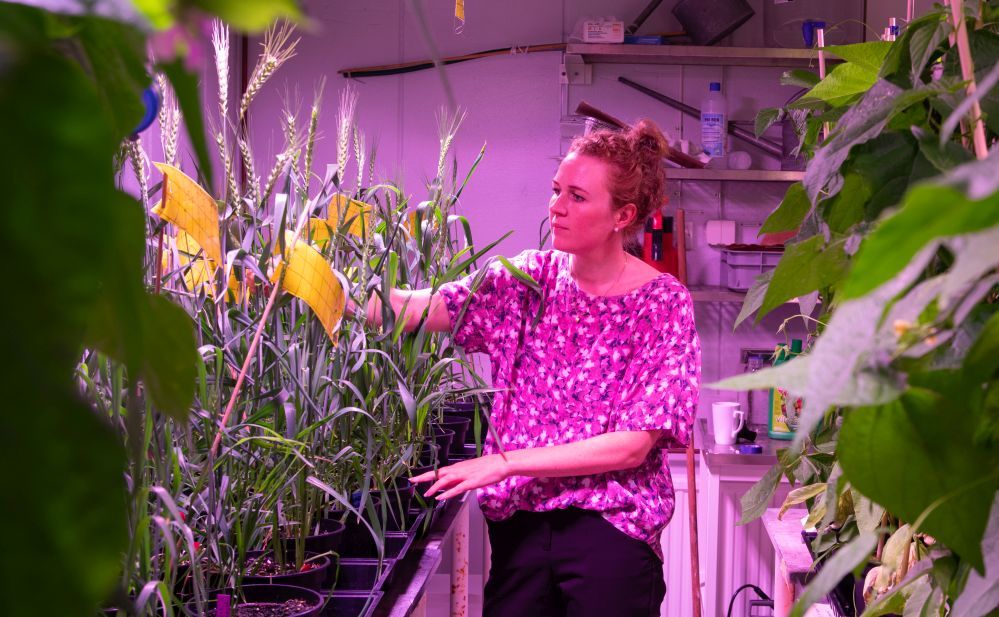[Disclosure: AgFunderNews’ parent company AgFunder is an investor in OlsAro.]
OlsAro—a Swedish startup developing wheat varieties resilient to environmental stressors—has raised a €2.5 million ($2.7 million) seed round led by Future Food Fund and PINC, the venture arm of Paulig, with participation by AgFunder, FLORA Ventures, Mudcake, and current investors.
The capital will be spent on expanding the team and commercializing OlsAro’s first product, a salt-tolerant wheat variety shown in field trials in Bangladesh to deliver significant increases in yield vs local varieties in saline soil, “enabling farming on otherwise unfarmable land,” says CEO Elén Faxö.
While a fair amount of work has gone into research on salt tolerant rice, there are “not many valid commercial options on the wheat side,” claims Faxö, who says OlsAro is also working on developing crops that are more heat-tolerant and have improved nitrogen efficiency, which would reduce dependence on synthetic fertilizers.
She adds: “We’re seeing a steady reduction in the amount of cultivatable land due to soil salinity, which can mean lower yields or [at worst] no growth at all. This [higher salinity] is in part due to flooding and cyclones, but also due to the lack of freshwater, where farmers have been irrigating with saline water or brackish water, so it’s a huge addressable market.”
In Bangladesh, OlsAro has got three years of data from field trials, “and compared to the control of moderately salt-tolerant wheat, we have a 52% higher yield,” claims Faxö. “During the dry season, the salt gets even more concentrated and farmers don’t cultivate. So with our salt-tolerant wheat, we can make an additional crop season possible.”
She adds: “We have a commercial contract in place with a seed company headquartered in Bangladesh, but we are not out on the market yet, as we have the standard regulatory process ahead of us. We are also conducting field trials for salt tolerant crops in Nepal, Pakistan and Oman and soon in Kenya. We are also targeting Australia and India.
“The aim is to get on the variety list in Bangladesh, where we intend to be out on the market by late 2025 or early 2026.”
“The investment will enable us to expand our geographical reach, refine our proprietary tech platform and continue our journey towards discovery of crops that can thrive in challenging climate conditions, boosting food security and resilience in the global food system.” Elén Faxö, CEO, OlsAro
“OlsAro came through the AgFunder GROW Impact Accelerator in 2023, when I got to know Elén and the team’s AI-driven trait discovery platform. Its first product to market, salt-tolerant wheat, will give smallholder farmers all over the world the ability to farm unusable land again. That is no small achievement, and it is just the beginning.” Michael Dean, founding partner, AgFunder
Two development paths depending on regulatory landscape
According to Faxö, OlsAro has two development paths depending on the regulatory landscape in markets it is targeting.
“The first is what we call line development,” she says. “So we have a population that is treated by EMS mutagenesis, where we treat the seeds with a specific substance to introduce very high genetic diversity. We have a proprietary population of over 2,000 wheat lines with very high genetic diversity. We can then commercialize lines moving into new varieties from screening in our population. From the phenotypic screening we know that we have the [desired] trait.
“But [in OlsAro’s second development path] we can also [identify the] genetic coding that gave rise to this specific trait and develop genetic events, SNPs [single nucleotide polymorphisms or genetic variations] for our specific trait of interest. And those in turn, can also be inserted via gene editing, or we can use marker assisted breeding.”
Underpinning this is a “database of genomic data, field data, transcriptomics and so on. And then we also have AI that enables us to speed development that we are continuously building on,” says Faxö.
“We use machine learning to screen down on the SNPs of interest for salt tolerance, then the next step is to go for gene editing of local elite varieties.”
She adds: “We’ve done field trials in multiple geographies, and it seems like our seeds are well adapted also for different conditions. However, we cannot be sure, and that’s one reason why we’re also looking at gene editing, because this would enable us to work with local [wheat] varieties that are already adapted for local conditions.”
“Our platform, enriched by a decade of research and a unique genetic diversity, empowers us to introduce wheat varieties designed to thrive under adverse conditions. This funding is a catalyst for us to broaden our technological capabilities and extend our impact on a global scale. It’s an exciting time for OlsAro, as we harness AI and plant biotechnology to forge a path towards sustainable food systems that can withstand the challenges ahead,” Henrik Aronsson, CTO, OlsAro
The business model
So what is OlsAro’s business model, and aren’t all the major seed companies working on salt tolerance in-house?
“So we’re a seed pre-breeder, so our customers are the seed companies,” says Faxö. “I’d say they haven’t all woken up yet to this challenge but many of them now recognize it is huge. Our partner in Bangladesh for example is a player that reaches 10 million farmers and they have a focus on soil salinity, because it’s a huge issue in many of their markets.”
Asked if OlsAro’s work on salt tolerance in wheat translates to other crops, Faxö says: “It is a matter of looking at what genes there are changes in and if there’s a homology in the genes that are changed [in wheat] with other crops, which is very likely, especially for other grains.”





